If you didn’t attend the March 9 climate change forum at Village Presbyterian Church, you missed out. The forum, attended by over 100 people, was a panel discussion featuring experts articulating a variety of perspectives on climate change — moral, social, theological, economic, environmental and national security. It was a wonderful example of a Green Team involved in outreach and education with their congregation and the public.
The green team at Village Presbyterian Church sponsored “The Environmental Forum on Climate Change”, a panel and discussion held on March 9 in conjunction with Village University’s teaching program. The Village Church Green Team, with training from the Sustainable Sanctuary Coalition, is a great example of what we can do by maintaining and expanding our interests in religion and environment, working with people who care not only about the environment, but also care deeply about their church or temple, religious teachings, and of course individuals with commitments to their individual spiritual development. This unique and outstanding forum provided the audience a chance to hear the facts on the widespread implications of global climate change (CC) at the local environmental level as well as the global. The forum taught about the impact of CC on U.S. security and at the same time taught people to consider the spiritual, moral and ethical issues stemming from the industrial age. The speakers presented solutions to curbing U.S. emissions of greenhouse gases (GHG) that involve personal choices (what vehicles we drive, how much we drive, carpooling, mass transit, how much fossil fuel we use); political choices (what our leadership can do to control GHGs at the city, state and federal level, for example carbon taxes; reduce energy use in government services like water treatment and government purchasing and buildings); and to consider our religious choices (what our various faith-based leaders teach about creation care as a fundamental tenant of the Judeo/Christian biblical creation story and other religions’ creation stories). The following is a brief summary of each presentation at the forum.
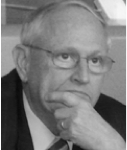 One of the most captivating panelists at the forum was Dr. W. Chris King, retired Brigadier General, who serves as Dean of the US Army Command and General Staff College at Fort Leavenworth. Dr. King’s presentation brought home the international aspects of global climate change. According to Dr. King, environmental security is a key component of national security. During his talk, he stressed the clarity of certain environmental facts. For example, regardless of the debate over the cause of global warming, unfettered human activities can damage our environment on a global scale. Dr. King acknowledged the importance of the moral, theological discussions about climate change under discussion at the forum. He also suggested that whether or not one accepts the moral obligation of the U.S. to respond to climate change, isolationism in environmental protection is not an achievable strategy. Dr. King suggests that all things are connected, that it is not possible to separate the air or water in the U.S. from impacts due to overseas pollution. He spoke in stark terms about potentially disastrous flooding in Bangladesh, where India has already prepared for climate refugees by building a fence completely surrounding Bangladesh. Taking action in the U.S. will involve costs, but those costs will be cheaper than the costs of not addressing environmental security. At the forum, Dr. King did not suggest specific response actions to improve environmental security. However, he has written extensively about this topic elsewhere. For a link to an informative article outlining military actions and plans for the US Dept. of Defense, see http://www.usma.edu/gene/SiteAssets/Sitepages/Publications/Security.pdf
One of the most captivating panelists at the forum was Dr. W. Chris King, retired Brigadier General, who serves as Dean of the US Army Command and General Staff College at Fort Leavenworth. Dr. King’s presentation brought home the international aspects of global climate change. According to Dr. King, environmental security is a key component of national security. During his talk, he stressed the clarity of certain environmental facts. For example, regardless of the debate over the cause of global warming, unfettered human activities can damage our environment on a global scale. Dr. King acknowledged the importance of the moral, theological discussions about climate change under discussion at the forum. He also suggested that whether or not one accepts the moral obligation of the U.S. to respond to climate change, isolationism in environmental protection is not an achievable strategy. Dr. King suggests that all things are connected, that it is not possible to separate the air or water in the U.S. from impacts due to overseas pollution. He spoke in stark terms about potentially disastrous flooding in Bangladesh, where India has already prepared for climate refugees by building a fence completely surrounding Bangladesh. Taking action in the U.S. will involve costs, but those costs will be cheaper than the costs of not addressing environmental security. At the forum, Dr. King did not suggest specific response actions to improve environmental security. However, he has written extensively about this topic elsewhere. For a link to an informative article outlining military actions and plans for the US Dept. of Defense, see http://www.usma.edu/gene/SiteAssets/Sitepages/Publications/Security.pdf
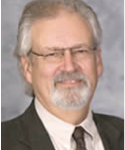 “We did not leave the stone age because we ran out of stones.”
“We did not leave the stone age because we ran out of stones.”
Dennis Murphey, Chief Environmental Officer for the City of Kansas City, Missouri, brought key insights to the forum about local responses to global climate change. Mr. Murphey suggested that we are hearing a lot about climate change and the effect it is having on our world. The greater Kansas City metropolitan area is experiencing growing public interest in energy efficiency, renewable energy, high-mileage hybrid vehicles, and even a light rail transit system. For example, he said that the City of Kansas City has a goal to reduce GHG emissions from City government operations by 30% below year 2000 levels by the year 2020. The City is working with community leaders to develop a realistic, but ambitious, goal for community-wide GHG reductions.
Mr. Murphey brought hope to the forum by stressing that our local government officials are beginning to emphasize environmental quality. He also noted that for most people, it’s hard to imagine how a single person can help solve a global problem. The truth is, one person can make a difference, an entire city can make a big difference, and a metro area working together can make an even bigger difference.
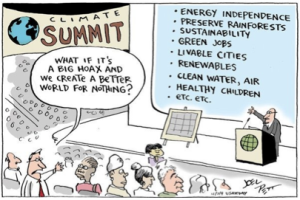 Mr. Murphey mentioned a humorous cartoon that was popular after the UN Framework on Climate Change Convention in Copenhagen 2009, as being appropriate for consideration at the Forum because it captures the integration and mutually agreeable goals of changing our way of life for a better world and reducing the GHG. That cartoon has been reprinted here for outreach and educational purposes only. Mr. Murphey concluded his remarks with a simple challenge and one of his favorite sayings, “We did not leave the stone age because we ran out of stones.” He suggested now is the time to leave the industrial age and begin the ecological age and we don’t have to wait until we run out of fossil fuels to do it. For more about Mr. Murphey’s ideas on sustainability and the KC Metro Area, see this webpage for an article he wrote in 2012,
Mr. Murphey mentioned a humorous cartoon that was popular after the UN Framework on Climate Change Convention in Copenhagen 2009, as being appropriate for consideration at the Forum because it captures the integration and mutually agreeable goals of changing our way of life for a better world and reducing the GHG. That cartoon has been reprinted here for outreach and educational purposes only. Mr. Murphey concluded his remarks with a simple challenge and one of his favorite sayings, “We did not leave the stone age because we ran out of stones.” He suggested now is the time to leave the industrial age and begin the ecological age and we don’t have to wait until we run out of fossil fuels to do it. For more about Mr. Murphey’s ideas on sustainability and the KC Metro Area, see this webpage for an article he wrote in 2012,
http://privatebank.fireflymkt.com/green_1_4.htm
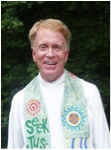 Rev. Jay McKell, was the only panelist at the forum with expertise in religion and ecology. Rev. McKell was the founding pastor of Grace Covenant Presbyterian Church in Overland Park, Kansas, where he served for 25 years as its senior pastor. During his tenure, he fostered the formation of Kairos, a group called to address intertwined issues in the realms of peace, justice and the environment. In 2011, he joined the staff of Village Presbyterian Church as interim pastor of Pastoral Care.
Rev. Jay McKell, was the only panelist at the forum with expertise in religion and ecology. Rev. McKell was the founding pastor of Grace Covenant Presbyterian Church in Overland Park, Kansas, where he served for 25 years as its senior pastor. During his tenure, he fostered the formation of Kairos, a group called to address intertwined issues in the realms of peace, justice and the environment. In 2011, he joined the staff of Village Presbyterian Church as interim pastor of Pastoral Care.
Rev. McKell said that one of the common links between environmentalists and religious folk is that we are all in the saving business. He explained that many environmentalists see themselves as devoting time and talents to saving the earth while people in the church see their role as saving souls. According to Rev. McKell, the two cannot be separated. During the forum, he explained why using Judeo/Christian theology. One of his most interesting comments was on the biblical creation story, noting that all creation is sacred and although humans were made in the image of God, a bit later the story says we are made from “the dust of the ground.” This led Rev. McKell to a very interesting and thoughtful question: “If God is sacred, … then we who are made in the image of God are also sacred. But we can’t stop there for if we are made from ‘the dust of the ground” then is it not also true that the dust of the ground is sacred as well?” In helping us answer the question, Rev. McKell provided a lesson in language: noting that we can see this connection in the Hebrew word “a-dam,” which literally means humankind, which is closely related to the world Hebrew “adamah,” meaning soil. Also, he mentioned that our own English language makes this connection between the word “human” and the word ”humus,” the first referring to us and the second referring to dirt, also come from the same source.
In concluding, Ref. McKell noted that today we might join together with others and with God in protecting creation by working to return to a more faithful understanding of who we are, where we come from, and to the job God has given us to serve, observe, and preserve our earthly home.
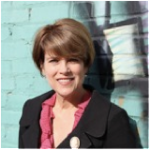 “When you’re driving an SUV or a HMMR, do your best to fill it up with passengers every time you drive it.”
“When you’re driving an SUV or a HMMR, do your best to fill it up with passengers every time you drive it.”
Kristin Riott is the Executive Director of Bridging The Gap, Kansas City’s premier environmental organization that recently celebrated its 20th Anniversary. Ms. Riott rounded out the panel with specific information about climate change. She is an articulate and specially trained spokesperson on the topic of climate change since 2007, when she studied about climate change under former Vice President Al Gore. Ms. Riott holds an MBA and an undergraduate degree in English Literature from Indiana University.
Ms. Riott’s gave a compassionate and uplifting speech providing the clear facts about global climate change and its impacts on sea level rise, ocean acidification, increase severity of weather events, and potentially catastrophic impacts if the levels of greenhouse gases are not significantly reduced in the coming decades. Ms. Riott mentioned that Kansas City has received $20 million from the federal government for improving environmental protection and sustainability in the area. Ms. Riott noted during her remarks that what is good for the environment is also good for the corporate bottom line and good for the economy. She concluded her remarks by emphasizing that everyone can make a difference by adopting a new ways of life that conserve resources, reduce, reuse and recycle precious resources and recognize that environmentalism goes to the heart of our social and economic development.
Altogether more than 100 people attended the Forum, including all ages, people of different backgrounds, members of the Village Church, at least 10 people from SSC, and even a number of people from the U.S. EPA. In addition, the Forum sponsored information booths by SSC, Sierra Club, KS Interfaith Power and Light, and Earthkeepers of Heartland Presbytery. This forum not only provided much needed basic information on CC and sustainability, but also raised consciousness of the people in the audience about the moral and ethical ramifications of CC.
We at Sustainable Sanctuary Coalition had a lot to learn at this forum. Mostly, it was fascinating to witness the success of one green team. We hope it is a good example of what any one of the many dedicated green teams can do.